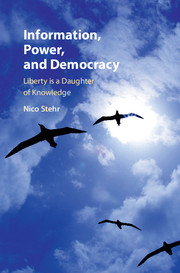Book contents
- Frontmatter
- Contents
- List of figures
- List of tables
- Introduction
- 1 Coming to terms
- Excursus: How much knowledge does democracy need, and how expensive should it be?
- 2 Accounts of the conditions for the possibility and the resilience of liberty
- 3 The economic order ensures (defeats) liberty
- 4 Scientia est libertas
- Excursus: An inconvenient democracy: knowledge and climate change
- Knowledge and democracy: summary and conclusions
- Bibliography
- Index
3 - The economic order ensures (defeats) liberty
from Excursus: How much knowledge does democracy need, and how expensive should it be?
Published online by Cambridge University Press: 05 December 2015
- Frontmatter
- Contents
- List of figures
- List of tables
- Introduction
- 1 Coming to terms
- Excursus: How much knowledge does democracy need, and how expensive should it be?
- 2 Accounts of the conditions for the possibility and the resilience of liberty
- 3 The economic order ensures (defeats) liberty
- 4 Scientia est libertas
- Excursus: An inconvenient democracy: knowledge and climate change
- Knowledge and democracy: summary and conclusions
- Bibliography
- Index
Summary
Poverty is the cause of the defects of democracy. That is the reason why measures should be taken to ensure a permanent level of prosperity … Where democracies have no middle class, and the poor are greatly superior in number, trouble ensues, and they are speedily ruined.
Aristotle, Politics, p. 35The contention that liberty is a daughter of knowledge appears to find its strongest intellectual, but also political, competitors in the thesis that either the market process itself is a facilitator of freedom or, more specifically, that certain market outcomes are the catalyst of liberty and democracy. Both John Maynard Keynes and Joseph Schumpeter, to name but two outstanding minds from the field of economics from the past century, have commented on the affinity between capitalism and liberty. For John Maynard Keynes, as far as vital human activities are concerned, capitalism is not the ultimate goal or an end in itself: capitalism for Keynes, as expressed for example in his essay “Economic possibilities for our grandchildren” (1930), “was necessary for freedom, but the activities of a capitalist society were not themselves an essential part of what freedom was all about” (Backhouse and Bateman, 2009:663). In a much stronger sense than Keynes, Joseph Schumpeter (1942:297), in his Capitalism, Socialism and Democracy, maintains that “modern democracy is a by-product of the capitalist process.” More recently, Schumpeter's elementary thesis finds support from another eminent economist: Mancur Olson. As Olson (2000:132) stresses, “it is no accident that the countries that have reached the highest level of economic development and have enjoyed good economic performance across generations are all stable democracies.” However, the assertion that capitalism is a foundation of liberty is obviously not without its detractors, most prominently Marxists and Socialists, but also liberal theorists such as Max Weber ([1906] 1980), for example, who see a capitalist economic order and democracy in essential opposition. But put in a less oppositional manner: in the view of the critics of the elective affinity of liberty and capitalism, the intersection of capitalism and democracy is in fact small.
- Type
- Chapter
- Information
- Information, Power, and DemocracyLiberty is a Daughter of Knowledge, pp. 129 - 161Publisher: Cambridge University PressPrint publication year: 2015



